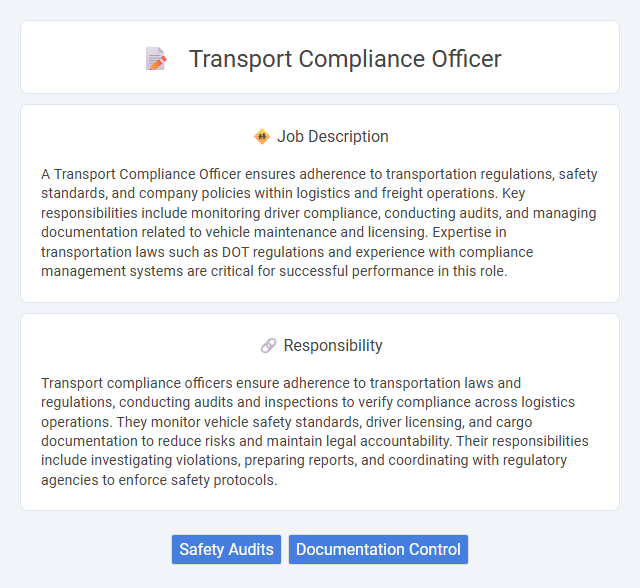
A Transport Compliance Officer ensures adherence to transportation regulations, safety standards, and company policies within logistics and freight operations. Key responsibilities include monitoring driver compliance, conducting audits, and managing documentation related to vehicle maintenance and licensing. Expertise in transportation laws such as DOT regulations and experience with compliance management systems are critical for successful performance in this role.
Individuals with strong attention to detail and a firm sense of responsibility are likely suitable for a Transport Compliance Officer role. Those who can handle regulatory environments and enforce standards consistently may thrive in this position. Candidates with a calm demeanor and good communication skills are probably better equipped to manage compliance challenges effectively.
Qualification
Transport compliance officers typically require a bachelor's degree in logistics, transportation management, or a related field, alongside certifications such as Certified Transportation Professional (CTP) or Hazardous Materials Certification. Strong knowledge of federal and state transportation regulations, including FMCSA and DOT standards, is essential for ensuring adherence to legal requirements. Experience with safety protocols, auditing, and risk management enhances qualifications for this role.
Responsibility
Transport compliance officers ensure adherence to transportation laws and regulations, conducting audits and inspections to verify compliance across logistics operations. They monitor vehicle safety standards, driver licensing, and cargo documentation to reduce risks and maintain legal accountability. Their responsibilities include investigating violations, preparing reports, and coordinating with regulatory agencies to enforce safety protocols.
Benefit
Transport compliance officer roles likely offer benefits such as enhanced job stability due to the increasing regulatory demands in the transport industry. Employees in this position probably enjoy opportunities for career growth as compliance expertise becomes more valuable to organizations. Competitive salaries and comprehensive benefits packages may also be common, reflecting the importance of maintaining safety and legal standards in transportation.
Challenge
Transport compliance officer roles likely involve navigating complex regulations and ensuring adherence to safety standards, which presents significant challenges. The need to balance regulatory requirements with operational efficiency may require continuous vigilance and problem-solving skills. Managing the risk of non-compliance could also demand strategic planning and effective communication within diverse teams.
Career Advancement
Transport compliance officers play a crucial role in enforcing transportation regulations and ensuring safety standards across various sectors such as logistics, public transit, and freight operations. Career advancement in this field often involves progressing from entry-level compliance roles to senior positions like Compliance Manager, Risk Analyst, or Transport Safety Specialist, with opportunities to lead regulatory audits and develop company-wide compliance strategies. Obtaining certifications such as Certified Safety Professional (CSP) or Certified Transportation Professional (CTP) can significantly enhance promotion prospects and open pathways to executive roles within transportation compliance and safety management.
Key Terms
Safety Audits
Transport compliance officers conduct rigorous safety audits to ensure adherence to regulatory standards and company policies. They analyze operational procedures, identify potential hazards, and recommend corrective measures to mitigate risks in transportation activities. These audits play a crucial role in maintaining safety, reducing accidents, and ensuring legal compliance within the transport sector.
Documentation Control
Transport compliance officers oversee regulatory adherence in transportation operations, with a strong emphasis on documentation control to ensure accuracy and legal compliance. They manage and audit transport documents such as licenses, permits, shipping manifests, and inspection records, ensuring all paperwork aligns with industry standards and government regulations. Efficient documentation control by these officers minimizes risks of violations and supports seamless transport logistics management.
 kuljobs.com
kuljobs.com